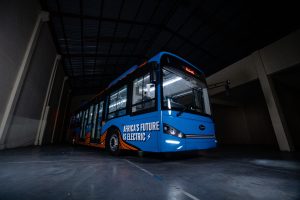Umamah Bakharia | ub@radioislam.co.za
2 min read
6 December 2022 | 11:00 CAT
Countries in Africa like Nigeria and Kenya are debuting electric vehicles, which they say will increase deployments, especially in the public transport sector.
In agreement, analysts say that this development can have a positive effect by electrifying public transport, climate emissions can be reduced, and air in cities can be clean.

Photo credit: Disrupt Africa
Speaking to Radio Islam International, Tom Courtright, the Research Director for the Association for Electric Mobility and Development in Africa (AEMDA) based in Nairobi, says loadshedding can hinder progress.
“This should be a push for the government to add more generation to the grid to increase grid stability so which could mean including more batteries on the grid to keep the grid constant and adding more renewable energy to have more energy on the grid, so it doesn’t slow power, so we always have electricity being generated in the background,” he says.
This comes as a Kenyan e-mobility firm BasiGo recently secured $6.6 million in funding to finance electric buses, which, according to Courtright, is possible due to geothermal power.
He adds that vehicles with smaller battery sizes will be the first to be tested with this new development because of the low costs.
“The fastest to electrify will be the motorcycles and tuk-tuks [because of their low costs],” says Courtright.
According to Mordor Intelligence, Africa’s electric vehicle market was valued at $11.94 billion in 2021 and is expected to reach $21.39 billion by 2027.
Courtright predicts that Africa’s future for electric vehicles will see battery swapping stations that will reduce the cost of the vehicle.
Listen to the full interview with Tom Courtright here:







0 Comments